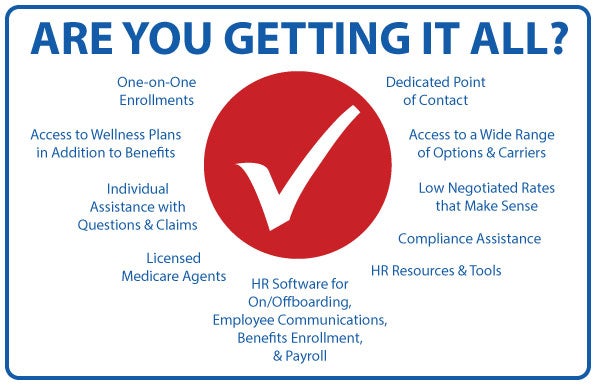
In the world of small business health insurance, there are many different players – group health insurance providers, agents, brokers, carrier representatives – the list goes on. So what services does the benefits broker offer? Many would say the answer was that the broker is there to provide insurance quotes and help you make a decision on which group health insurance provider to go with. In actuality, the answer is a lot longer and more complicated than that. Here are ten things your benefits broker should be doing besides quoting insurance:
1. Negotiating Rates
Your group health insurance provider should be negotiating your group’s rates on your behalf. With these negotiations also comes an unbiased comparison of the coverage of different insurers. Unfortunately, with all that’s happening in health reform, the industry is seeing a rise in group health insurance costs at almost every renewal. It’s your broker’s job to find the best rates combined with the best coverage on your behalf.
2. Offering Access to a Wide Range of Carriers
Part of keeping rates low can involve searching for opportunities to reduce overall premiums by bundling various types of insurance. Your broker should provide you access to a wide range of carriers across various types of insurance – not just group health insurance.
3. Adding Value with HR Resources, Tools and Software
It’s in your best interest to find a benefits broker that gives you access to HR resources and tools to make your life easier. With ready to go content such as posters, emails, articles and employee handbooks, communicating to your employees will be a breeze. You’ll also find employee data management much less time consuming with simple HR software. Not many brokers offer this added service, so it’s an important question to ask when choosing a group health insurance and wellness broker.
4. Providing Free Enrollment & Benefits Counseling
Your company should never be charged by your group health insurance broker for enrollment or benefits counseling. Consulting services such as these should be covered by the commission the broker receives from each insurance carrier.
5. Assisting with Claims
Claims can be a complicated process in some cases. It’s important to know that your group health insurance broker will go to bat for you when the time is needed. An attentive benefits broker will handle your claims and questions in a timely and fair manner.
6. Implementing One on One Enrollments
Part of the broker’s job is to provide one on one enrollment services and benefits counseling to all of the employees in the company. Addressing the specific needs of each individual is paramount to ensuring the group health insurance plan and other insurances meet employee requirements.
7. Providing Access to Wellness Plans in Addition to Benefits
If your broker hasn’t yet given you access to wellness plans, you may be missing a huge opportunity to reduce the overall group health insurance rates. When implementing a multi-year wellness strategy, a wellness plan can greatly increase the health of your employees while engaging them in positive behavioral changes.
8. Maintaining Compliance
ERISA, ACA, HIPAA/HITECH – just to name a few – are all important when you’re talking about benefits and wellness compliance. Your benefits broker should be assisting you in keeping your records straight as well as submitting your documents on time. Penalties and fines can cost a pretty penny if your company falls behind on compliance. Having a benefits broker that is well versed in legislation is key to avoiding these issues.
9. Licensed Medicare Agents
As our population grows older, so do our workers. More and more employees are becoming Medicare eligible before they retire. Special licensing can be obtained by insurance agents to address the specific needs of these individuals. The importance may not seem apparent, but in quoting small group health insurance, age is a large determinant on rates.
10. Dedicated Point of Contact
Lastly, your benefits broker should assign you a dedicated and experienced single point of contact so that your needs are taken care of quickly and intelligently. There’s nothing like leaving countless voicemails with no confidence in a return call. You and your business should be the benefits broker’s highest priority.
Whether you’re in the market for group health insurance or a wellness plan, make sure you choose a broker that is offering all of the added benefits it should be.
